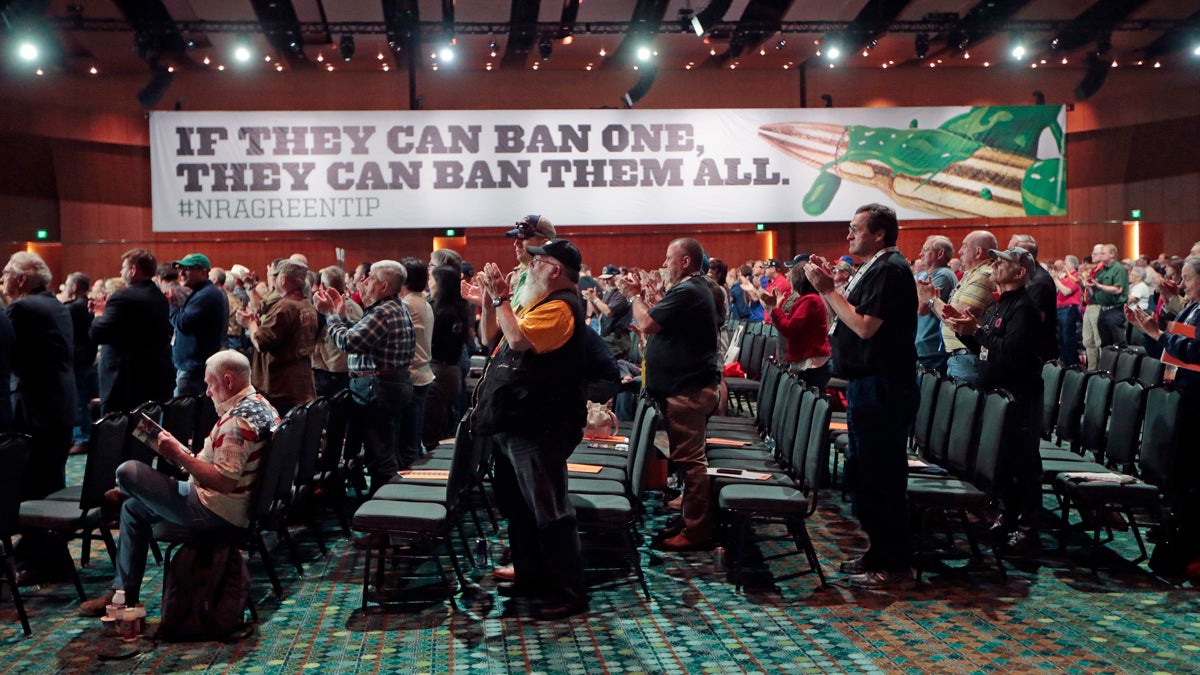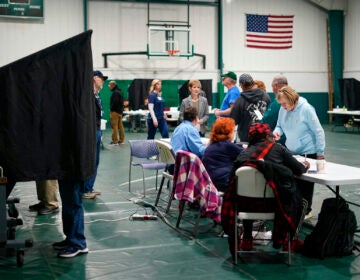Next move in Pa. gun debate: cities, gun-control advocates and opponents consider options

National Rifle Association members applaud a speech during the annual meeting of members at the NRA convention in April in Nashville, Tennessee. (AP file photo)
With a controversial state law granting special legal status to gun-rights groups now overturned, cities and townships across the state must decide whether to bring back their local gun ordinances.
With a controversial state law granting special legal status to gun-rights groups now overturned, cities and townships across the state must decide whether to bring back their local gun ordinances.
“Our borough council was very disappointed to have to repeal the ordinance,” said Ed Foley, mayor of Jenkintown, one of the many municipalities that took its gun-control ordinances off the books in response to the passage of the state law. “We’ll look into reinstating it as quickly as we can.”
“People want to put those ordinances back on the books. Some will do so quickly. Some will wait and see if there’s an appeal,” said Shira Goodman, head of the gun control advocacy group Cease Fire PA. “Many of these towns felt they were forced into a corner, acting under duress.”
The overturned law, known as Act 192, gave gun rights groups the power to sue towns and municipalities whose gun laws contradict the state’s, without having to find a resident who could show “harm” caused by the local law. Act 192 also required that local governments that lost in court pay the victor’s legal fees.
That led about 100 Pennsylvania towns and cities to take their gun-control regulations off the books rather than risk losing a costly lawsuit. Last week’s ruling overturning Act 192 has taken that concern off the table for now, and gun-control advocates such as Goodman hailed the ruling as a victory for due process.
“This holds the Legislature and activist groups, including us, to the standards that the [Pennsylvania] Constitution sets for how laws get passed,” said Goodman, who called Act 192 a “gift-wrapped package” for the gun lobby. “That’s good for the people, it’s good for public safety and it’s good for cities.”
The NRA on local laws: ‘They’re Illegal’
However, gun-rights advocates are holding firm to the interpretation that local gun ordinances differing from state laws are illegal. They say granting “standing” to organizations such as the NRA that allows them to sue on their own — that is, without finding a resident to serve as plaintiff — will help prevent local governments from overstepping their bounds.
“The fact that an illegal ordinance exists is in itself harm,” said Jonathan Goldstein, an attorney representing the NRA in Pennsylvania. “For many, many years, these gun-control folks have been trotting around the state trying to get folks to pass these ordinances, notwithstanding the fact that they’re illegal.”
Goldstein said that the presence of the ordinances — which typically include lost-and-stolen gun reporting requirements and bans on carrying in parks or shooting within city limits — would tend to “modify” the behavior of law-abiding gun owners, potentially putting them at risk.
The NRA has long complained about these sorts of local laws, but it has struggled to find residents with standing to serve as the face of lawsuits challenging them. Goldstein said it’s appropriate to remove the requirement to find a citizen who could show harm. The intention of the state legislators is clear and should serve as the final word, he said.
“The General Assembly has told us that they don’t want local governments passing ordinances that attempt to modify a uniform statewide scheme of firearms regulation,” he said. “That’s enough. Our courts have said that’s enough. Our General Assembly has spoken as to how it wants that system organized, the municipal governments have arrogated to themselves a view that they can make modifications to it, which they can’t, and we’re going to put a stop to it.”
However, Foley said he believes Jenkintown’s local ordinances are his constituents’ way of speaking out about an issue they care about. Even if the laws are largely symbolic, he said, they represent the voice of his community.
“Jenkintown is a very quiet suburb, and we don’t have a gun problem,” he said. “But the residents here are very cognizant of the gun problem in the region. When we can, we try to take leadership on issues important to residents’ safety or regional safety.”
Goldstein rejected that logic.
“Their mere presence on the books violates our state’s very clear pre-emption statute,” he said. “And if it’s just on the books to make a statement, they should consider very carefully whether they want to explain to their voters why they spent time and money defending them and putting them in place.
“Their time could be better spent solving problems related to taxation, schools and crime, and less on what they consider to be feel-good measures that infringe on the rights of law-abiding citizens,” he said.
Uncertain future for Act 192
Nonetheless, the future of Act 192 remains unclear, as Republican leaders in Harrisburg decide whether to appeal. It was overturned by a 7-1 vote, with even the dissenting judge agreeing that it was unconstitutionally passed. The key amendment was added at the last minute to a bill dealing with scrap metal, which the court found violated a constitutional requirement that bills deal with a “single purpose.”
A spokesman for House Majority Leader Mike Turzai, named as the lead defendant in the suit against Act 192, said. “We are currently reviewing the opinion, will be weighing our options with leadership and have 30 days to file an appeal, which we will strongly consider.”
Goodman said that while any outcome was possible, she saw signs suggesting that an appeal to the Pennsylvania Supreme Court wouldn’t be easy.
“I think the Commonwealth Court didn’t think it was a hard case,” she said, noting that Pennsylvania has a long history of detailed case law dealing with the “single purpose” question. “It didn’t take them that long to decide.”
The legislators could also choose to start over with a fresh bill. “Should it come back up, we believe there will be an even stronger outcry against it, and we’re ready,” Goodman said.
Foley said Jenkintown wouldn’t make any final decisions about its ordinance until he consulted with counsel, but he hoped that the town could restore it. “The residents I talked to were almost uniformly disappointed that we had to repeal it,” he said.
His advice to other towns and cities: “If it was a good idea when you passed the ordinance, look to reinstate it,” Foley said. “We will … and I hope others will too.”
Goldstein’s take is that cities that hang on to their ordinances are taking a costly chance.
“We’ll have to wait and see what the Supreme Court does,” he said. “Until there’s some clarity from the Supreme Court, municipalities that add these back do so at their own peril.”
WHYY is your source for fact-based, in-depth journalism and information. As a nonprofit organization, we rely on financial support from readers like you. Please give today.




